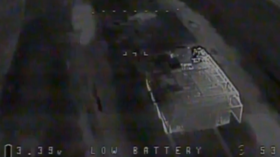CIA confesses to skeletons in the closet

The director of the U.S. Central Intelligence Agency confessed that since 2001 it has failed to tell Congress the truth about its clandestine operations on numerous occasions.
Without revealing any of the tempting details, or even a single shocking photograph, CIA Director Leon E. Panetta told a closed door oversight committee recently that the intelligence agency “concealed significant actions and misled lawmakers repeatedly since 2001.” Excuse me, but isn’t deception and subterfuge exactly the purpose of a security apparatus?
Anyways, the big question is: Why would the CIA choose this particular moment to come clean about its dirty laundry, especially when there are so many bigger fish to fry? Digging up an answer to this question will prove no small challenge. After all, there are more twists and turns in this Washington thriller than a James Bond adventure. But we can venture some wild guesses with the facts available.
Panetta could have been referring to exactly what the Democrats knew or didn't know about the use of “enhanced interrogation” techniques (more popularly known as ‘waterboarding,’ a form of torture that simulates the very unpleasant sensation of drowning) in the war on terror.
Indeed, Democratic House Speaker Nancy Pelosi lit the short fuse under the partisan tinderbox earlier this year when she told reporters that the (Bush) CIA misled Congress about the harsh interrogations of suspected terrorists.
Pelosi maintains that the Democrats, who have staked out the moral heights ever since the Bushies were booted out of office, were left in the dark about the use of torture. Meanwhile, the Republicans, standing firm on the belief that their medieval methods exposed more than one terrorist plot against God’s country, say the CIA briefed Pelosi many times on the issue.
“U.S. law requires the CIA to inform Congress of covert activities…,” The Washington Post reported in Dec. 2007. “In this case, most briefings about detainee programs (i.e. torture techniques) were limited to the “Gang of Four,” the top Republican and Democrat on the two committees.”
In this case, Pelosi, as the House Speaker, would have been briefed no less than 30 times by intelligence officials on the use of torture; that alone sounds like the very definition of torture. Later, the agency dug up files that show Pelosi had been briefed on the treatment of “high value” detainee Abu Zubaydah, who was allegedly exposed to the waterboarding treatment no less than on 80 separate occasions. But Ms. Pelosi refuses further comment on the allegations.
“I won’t have anything more to say about it,” the House Speaker snapped at reporters during a May 22 news conference.
Or even more through a glass darkly, there is the possibility that Panetta had a personal vendetta over what investigative journalist Seymour Hersh has exposed as "executive assassination rings" that allegedly reported directly to the office of the Vice President, then Dick Cheney.
"They've been going into countries," said Sy, "not talking to the ambassador or CIA station chief, and finding people on a list and executing them and leaving… In many cases, they are the best and the brightest."
Incidentally, it is the U.S. Congress that is supposed to keep the US intelligence agency on a tight leash.
“The public tussle… threatens to further undermine Congressional relations with the CIA,” reports The Wall Street Journal. “Congress exercises oversight over U.S. intelligence agencies.”
Another question that needs briefly asked is why did US President Barack Obama appoint Panetta, 71, a man with absolutely no experience in the intelligence community, to the almighty post of CIA director?
It would be tempting, given the present political imbroglio, to postulate that Obama is hoping to restore some sort of mutual respect and bonhomie between Congress and the CIA, which seems to have completely unraveled during the war on terror daze. In other words, the delicate moment requires the subtle hand of a former diplomat as opposed to the ruthless, cloak-and-dagger tactics of an intelligence czar to mend the rift.
But the mystery just keeps getting deeper. Despite the fact that the CIA has acknowledged that it “misled” Congress since 2001, the White House is threatening to veto a pending intelligence bill that will soon be landing on Obama’s desk.
The problem with the bill, as the Obama people see it, is that it would hand Congress more oversight powers when dealing with the covert activities of the intelligence community. In other words, instead of a maximum of eight lawmakers reviewing CIA tactics and techniques, the bill would allow for up to 40 members to pass judgment. Isn’t that exactly what we would want, especially with the brutal Bush days still taunting us in the rearview mirror?
For some reason, the White House begs to differ. Maybe they are afraid of going too soft on the fight against terrorism (yes, it is still with us) and then looking really bad if another 9/11-type monster should occur, God forbid. But by going against the recommendations of his own party, Obama finds himself towing the Bush line on this one. Instead of more transparency, the White House promises to blacken its windows, thus further eroding public trust. Go figure.
The Post-9/11 Intelligence Environment
Shortly after the brazen terrorist attacks of 9/11, and with battles raging in Afghanistan, the Bush administration had set its gunship-sights on Iraq, which had been a sitting duck ever since George I failed to take Baghdad in Operation Desert Storm.
And as the United Nation weapons inspectors painfully learned, there was no chance of convincing the Bush administration that Iraq President Saddam Hussein was not in cahoots with al-Qaeda, was not harboring weapons of mass destruction and was not some sort of contributing party to 9/11. In short, for the Bush administration, which had just been handed a ‘Go to War Anywhere You Want’ card, Iraq was simply too tempting a target to ignore.
Nothing – not the United Nations, not the millions of anti-war protesters around the globe, not good ol’ fashion democratic debate – was going to stop the Bush administration from taking its dream-theme “War on Terror” to the streets of Baghdad. Besides, weren't there supposed to be big welcoming parades to meet our troops? Unfortunately, tragically, no information out of the intelligence community that contradicted the case for war would take America off the warpath. This is conceded by many members of Washington.
The people in the Bush administration exerted “intense pressure in which the intelligence community officials were asked to render judgments on matters relating to Iraq when the most senior officials in the Bush administration had already forcefully and repeatedly stated their conclusions publicly,” said Senator John D. Rockefeller of Virginia.
Perhaps the best example of “senior officials in the Bush administration” declaring Iraq armed and dangerous without the slightest proof came in February 2003 when then U.S. Secretary of State Colin Powell, with CIA Chief George Tenet seated directly behind him, shook a bogus vial of anthrax while warning his wide-eyed audience: “Less than a teaspoon of dry anthrax – this is just about the amount of a teaspoon… shutdown the United States Senate in the fall of 2001.”
According to the Senate Intelligence Committee’s report on prewar intelligence about Iraq, most major judgments made about Iraq’s alleged nuclear, chemical and biological weapons programs were either “overstated or were not supported by the underlying intelligence reporting.”
It should also be noted that not even a teaspoon of anthrax was ever unearthed in Iraq.
Playing a Plame Game
The price for not towing the official line on the war on terror became clear with the case of Valerie Plame, a former CIA agent who had her identity publicly revealed due to a ‘mistake’ committed by her spouse.
Joseph C. Wilson, Plame’s husband, was sent to Niger in February 2002 on behalf of the CIA to investigate claims that Saddam Hussein had attempted to purchase enriched yellowcake uranium, the essential ingredient for nuclear weapons. After conducting dozens of interviews, the former ambassador of Niger came to the conclusion that the Bush administration did not want to hear: “it was highly unlikely that any such transaction had ever taken place.”
Nevertheless, in Bush’s 2003 State of the Union Address, the American president proclaims “The British government has learned that Saddam Hussein has recently sought significant quantities of uranium from Africa.”
In the July 6, 2003 issue of The New York Times, Wilson penned an op-ed entitled “What I did not find in Africa.” In this article, Wilson makes it clear that there was no evidence to support the claim from the Bush administration that Hussein was trying to buy uranium from Niger.
One week later, The Washington Post published an article by columnist Robert Novak, “Mission to Niger,” in which Valerie Plame’s CIA identity is revealed.
“Wilson never worked for the CIA,” Novak wrote, “but his wife, Valerie Plame, is an agency operative on weapons of mass destruction.”
Knowingly revealing the identity of a US security agent constitutes a federal offense punishable up to 15 years in prison. After a drawn-out investigation and subsequent trial, ‘Scooter’ Libby took the blame for outing Plame. He was sentenced to 30 months in federal prison, but George W. Bush, before departing from office, commuted the sentence. Today, Scooter is back on the streets.
In light of all of the political shenanigans, the repercussions for the US Republican party have been nothing less than devastating. Indeed, with the Democrats basking in the sunshine of political power with the seemingly faultless Barack Obama at the helm, the Republicans must contend with ugly questions concerning Guantanamo Bay, the use of torture, ‘black hole’ prisons in Eastern Europe, and the very rationale for going to war against terror in the first place. It must also contend with the loss of trust in some of the nation’s most valuable institutions, including that of the security services. Worse, they are presenting their case with the most odious individuals: like talk-show host Rush Limbaugh, and former Speaker newt Gingrich.
But perhaps the American public has gained something by this joyless ride. Unless the public memory proves itself to be short yet again, Americans will have, at the very least, the experience of marching off to an unwise war and all of the unnecessary death and destruction that that entails. It will understand fully the expression, ‘once bitten, twice shy.’ It will learn to ask more questions and not place all of its trust in the ‘experts.’ And then maybe, just maybe, the dogs of war will stay in their pens.













